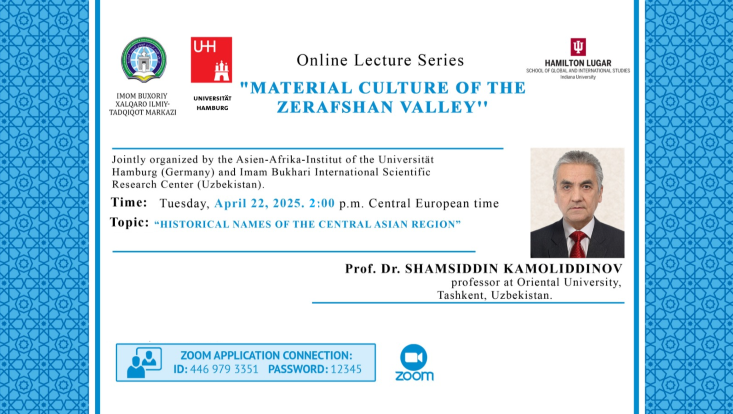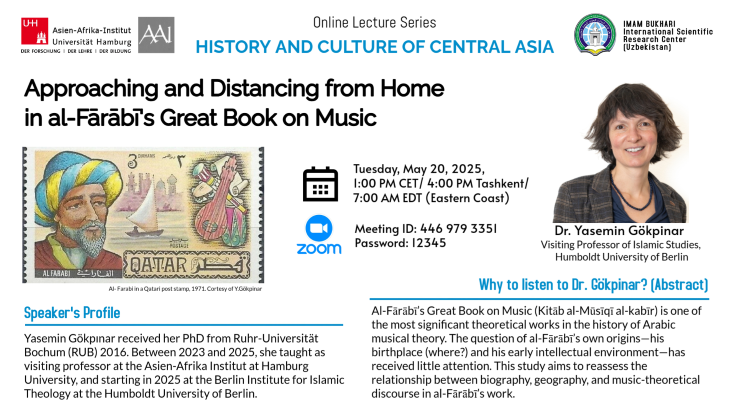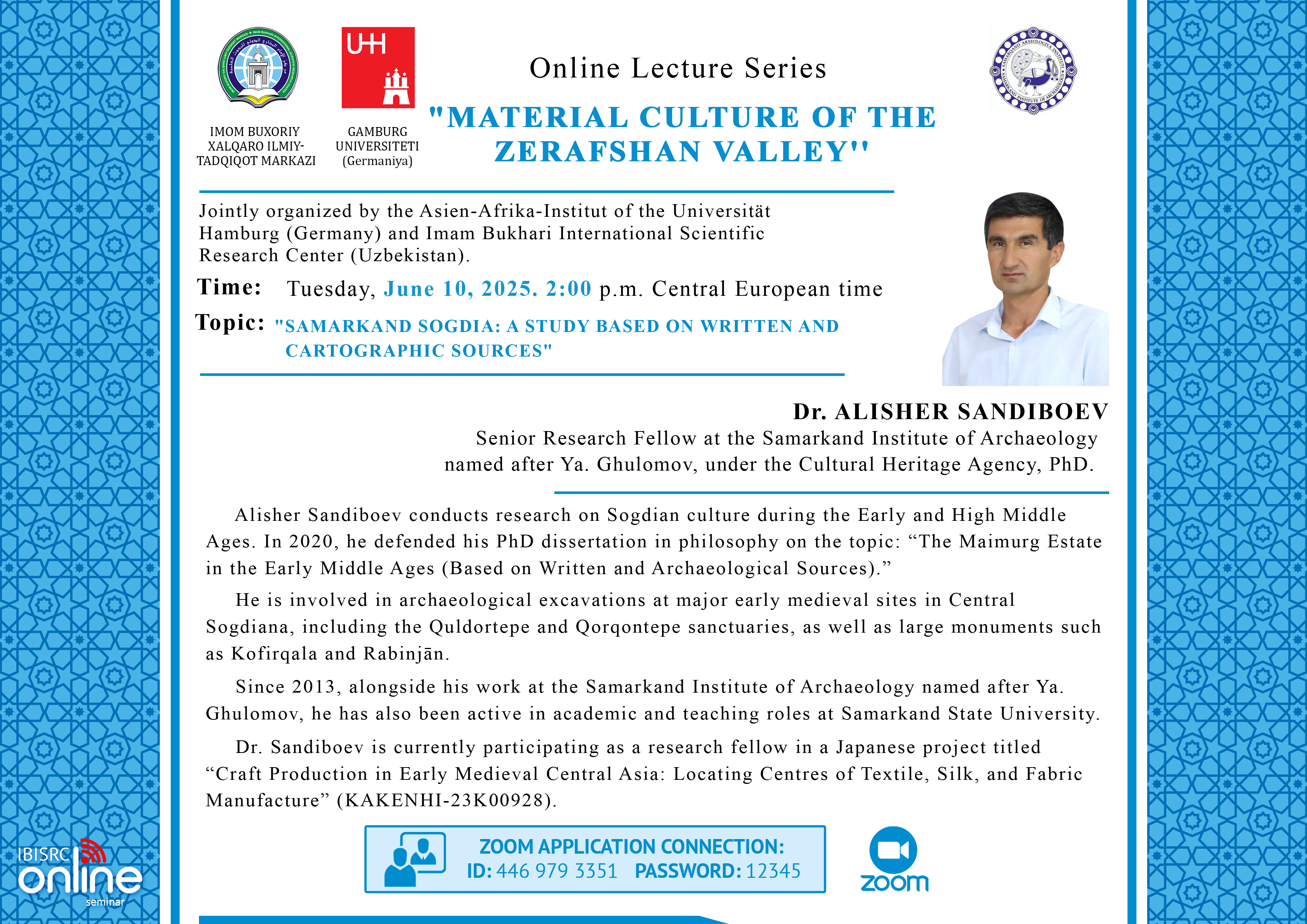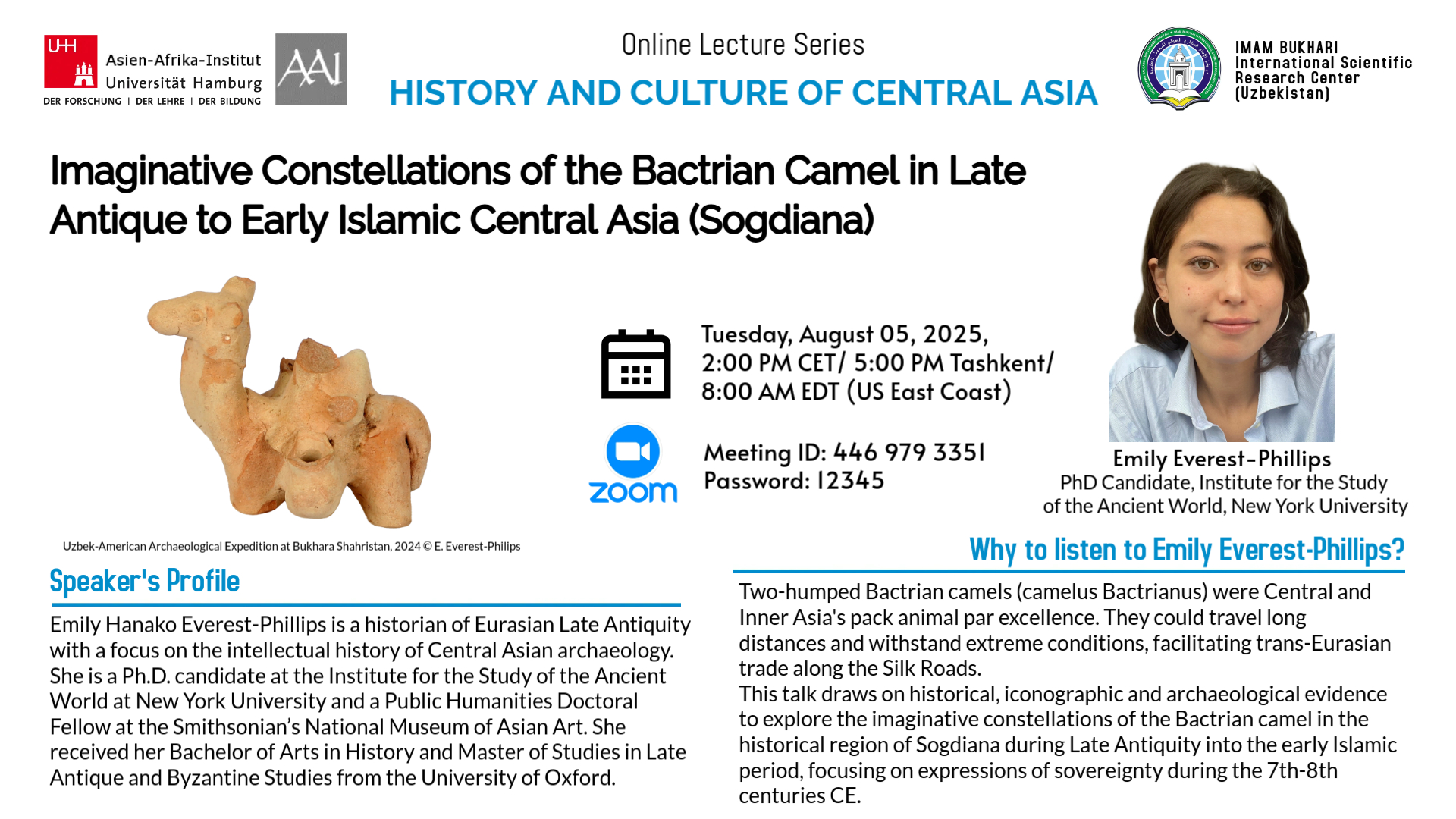Lecture Series on the History and Culture of Central Asia - 9th Edition
Lecture Series on the History and Culture of Central Asia
During the summer 2025, the ninth edition of our lecture series will take place. As usual the series consists of four lectures and takes place online via Zoom.
April 22, 2025 - Shamsiddin Kamoliddinov - "Historical Names of Central Asian Regions"

We cordially invite to our first lecture of this summer term's series on the history and culture of the Central Asia The lecture will be presented by Prof. Dr. Shamsiddin Kamoliddinov, Tashkent State Institute of Oriental Studies.
- Topic: Historical Names of Central Asian Regions
- Date: April 22th, 2025, 2:00 PM CET, 5:00 PM Tashkent Time, 08:00 Eastern Daylight Time (East Coast)
- Place: online via ZOOM
Why to listen to Prof. Dr. Shamsiddin Kamoliddinov:
What are the origins of the Uzbek people? The lecture explores its long ethnogenesis and history, that is the gradual process of its formation from tribal associations to a modern nation state. Prof. Kamoliddinov bases his study on the rich material culture and literary evidence.
Uzbek people originate from the people, in the land, where they still live, as well as its adjacent regions. The gradual formation of an Uzbek ethnic included different people, those proto-Turkic tribes from the steppes, as well as those of the more urbanized northeastern branches of the ancient Iranian-Sogdian, Bactrian, Khwarazmian and Sak-Massaghet cultures. Socio-economic relations, cultural contacts, and inter-ethnic marriages resulted over the centuries in an integration and assimilation of the people on various levels and finally to the formation of a new ethnic group, the Uzbek people.
Key words. Uzbek, ethnogenesis, Turkic and North-Eastern Iranian languages, Transoxiana, Dashti-Kipchak, Afrasiab, “Dīwān Lughat at-Turk”, the Huns, Western Turkic Khaganate, Western Karakhanids, independent Uzbekistan.
About the speaker:
Kamoliddin Shamsiddin Sirojiddin Ogly is a Doctor of Sciences in Historical and Oriental Studies and a Professor at the Tashkent State Institute of Oriental Studies, specializing in early medieval history and historical geography of Central Asia. He graduated from the Oriental Faculty at Tashkent State University in 1980, with a PhD focused on Abu Sa‘d al-Sam‘ani's "Kitab al-Ansab" (1988) and a post-doc on Arabic sources regarding Tokharistan and Southern Soghd (1993).
He specializes in the early medieval history and historical geography of Central Asia, focusing on the period from the Turkic Qaghanate (6th – 8th centuries AD) to the pre-Mongol era (9th – early 13th centuries AD), utilizing Arabian, Persian, and Turkic sources. He has authored over 40 books in Uzbek, Russian, and English, as well as approximately 300 articles in these languages, along with Arabic. Some of his articles have also been translated into Hungarian, Chinese, and Turkish.
In recognition of his contributions to Islamic studies, he received the special International Award from Sheikh ‘Abd al-‘Aziz al-Baptin, "For Descendants of Imam al-Bukhari," in 1999 (Kuwait). He is a member of the Islamic Manuscripts Association (Cambridge, 2010) and the International Society of Arabic Papyrology (Leiden, 2012). He has served on the advisory boards of several journals, including “Moziydan Sado” / “Echo of History” / “Эхо истории” in Tashkent, Uzbekistan (since 2012), “Vodiynoma” in Andijon, Uzbekistan (since 2016), and The Journal of Islamic Research / Islami Araştirmalar Dergisi at the University of Ankara, Turkey (since 2019).
Participation:
In order to participate, please click here or use the following Zoom credentials:
Meeting ID: 446 979 3351
Password: 12345
May 20, 2025 - Yasemin Gökpinar - "Approaching and Distancing from Home in al-Fārābī's Great Book on Music"

We would like to invite you to the next lecture in our series on the history and culture of Central Asia, with a special focus on the Zerafshan Valley, which we're also offering this summer term. The second lecture of this semester, "Approaching and Distancing from Home in al-Fārābī's Great Book on Music" will be presented by Dr. Yasemin Gökpinar, visiting professor at Humboldt University of Berlin.
- Topic: Approaching and Distancing from Home in al-Fārābī's Great Book on Music
- Speaker: Dr. Yasemin Gökpinar, visiting Professor for Islamic Studies, Humboldt Unviersity of Berlin
- When?: May 20th, 2025, 1:00 PM CET, 4:00 PM Tashkent Time, 7:00 AM EDT (US East Coast)
- Where?: Online via ZOOM
Why to listen to Dr. Gökpinar:
Al-Fārābī’s Great Book on Music (Kitāb al-Mūsīqī al-kabīr) is one of the most significant theoretical works in the history of Arabic musical theory. The question of potential references to al-Fārābī’s own origins—his birthplace (where?) and his early intellectual environment—has received little attention. This paper explores whether and how notions of proximity and distance, both literal and metaphorical, shape the structure, content, and conceptual framework of the Great Book on Music. Does al-Fārābī’s engagement with musical thought reflect traces of his homeland, or does it rather indicate a conscious intellectual distancing? By examining key passages of the text in their historical and philosophical context, this study aims to reassess the relationship between biography, geography, and music-theoretical discourse in al-Fārābī’s work.
Speakers Profile:
Yasemin Gökpınar combines the study of Islamic philosophy and manuscript culture with musicology. In 2016 she received her PhD from Ruhr-Universität Bochum (RUB). Between 2018 and 2023, she held the position of an executive assistant the RUB and while at the same time being research associate at the ERC project “Ancient Music Beyond Hellenization” at the Academy of Sciences (ÖAW) in Vienna. Between 2023 and 2025, she taught as visiting professor at the Asien-Afrika Institut at Hamburg University, and starting in 2025 at the Berlin Institute for Islamic Theology at the Humboldt University of Berlin.
Participation:
In order to participate, please click here or use the following Zoom credentials:
Meeting ID: 446 979 3351
Password: 12345
June 10, 2025 - Dr. Alisher Sandiboev -"Samarkand Sogdia: A Study Based on Written and Cartographic Sources"

The Asien Afrika Institute Hamburg and the Imam Bukhari Institute in Samarqand would like to invite you to the next lecture in our series on the History and Culture of Central Asia, with a special focus on the Zerafshan Valley. The Third lecture of this semester, "Samarkand Sogdia: A Study Based on Written and Cartographic Sources" will be presented by Dr. Alisher Sandiboev, Senior Research Fellow at the Samarqand Institute of Archaeology in Uzbekistan.
- Topic: Samarkand Sogdia: A Study Based on Written and Cartographic Sources
- Speaker: Dr. Alisher Sandiboev, Senior Research Fellow at the Samarqand Institute of Archaeology in Uzbekistan
- When? June 10th, 2025, 2:00 PM CET (Germany), 5:00 PM Tashkent Time, 8:00 AM EDT (American East Coast)
- Where? Online via ZOOM
Why to listen to Dr. Sandiboev?
Alisher Sandiboev conducts research on Sogdian culture during the Early and High Middle Ages. He is involved in several archaeological missions at major early medieval sites in Central Transoxiana. These includes the Quldotepe and Qurqontepe Buddhist Sanctuaries (Tajjikistan), as well as large monuments such as Kofirqala (Tajiskistan) and Rabinjan (Uzbekistan). He is currently working as research fellow in a Japanese-Uzbek cooperation project “Craft Production in Early Medieval Central Asia: Locating Centers of Textile, Silk and Fabric Manufacture.
Participation:
In order to participate, please click here or use the following Zoom credentials:
Meeting ID: 446 979 3351
Password: 12345
About the lecture series:
The series is jointly organized by Prof. Dr. Stefan Heidemann, Department of Islamic Studies at the Asien-Afrika-Institut (Universität Hamburg), and Dr. Shovosil Ziyodov, director of the Imam Bukhari International Scientific Research Center in Tashkent, Uzbekistan.
August 5, 2025 - Emily Everest-Phillips- "Imaginative Constellations of the Bactrian Camel in Late Antique to Early Islamic Central Asia (Sogdiana)"

The last lecture of this summer semester 's series on the history and culture of Cental Asia, will take place on July 15th, 2025, online via ZOOM.
- Topic: Imaginative Constellations of the Bactrian Camel in Late Antique to Early Islamic Central Asia (Sogdiana)
- Speaker: Emily Everest-Phillips, PhD Candidate, Institute of the Study of the Ancient World, New York University
- Date: August 5th, 2025, 2:00 PM CET, 5:00 PM Tashkent Time, 8:00 AM Eastern Daylight Time (US- East Coast)
- Place: Online via ZOOM
Why to listen to Emily Everest -Philips?
With a stamina for long-distance travel and the ability to withstand extremes in climate, two-humped Bactrian camels (camelus Bactrianus) are premodern Central and Inner Asia’s pack animal par excellence, responsible for facilitating long-distance, land-based networks of trans-Eurasian exchange of the so-called ‘Silk Roads’. In Late Antiquity and the early Middle Ages, camels are often evoked when describing the activities of Sogdian traders (ca. 5th-8th centuries CE), an association shaped to a great extent by highly stereotyped, exoticising images of Bactrian camels and Central Asian hu (胡) produced among Northern Chinese elites, for whom these camels and hu were couriers of coveted Western exotica from distant worlds. But what was the imaginative status of the Bactrian camel from Central Asian perspectives? This talk draws on historical, iconographic and zooarchaeological evidence to explore the imaginative constellations of the Bactrian camel in the historical region of Sogdiana during Late Antiquity into the early Islamic period, with a particular focus on expressions of sovereignty during the 7th-8th centuries CE.
Speaker's Profile:
Emily Hanako Everest-Phillips is a historian of Eurasian Late Antiquity with a focus on the intellectual history of Central Asian archaeology. She is a Ph.D. candidate at the Institute for the Study of the Ancient World at New York University and a Public Humanities Doctoral Fellow at the Smithsonian’s National Museum of Asian Art. She received her Bachelor of Arts in History and her Master of Studies in Late Antique and Byzantine Studies from the University of Oxford.
Participation:
In order to participate, please click here or use the following Zoom credentials:
Meeting ID: 446 979 3351
Password: 12345
